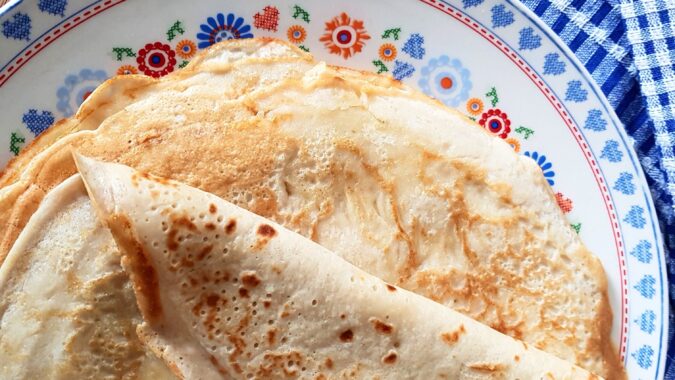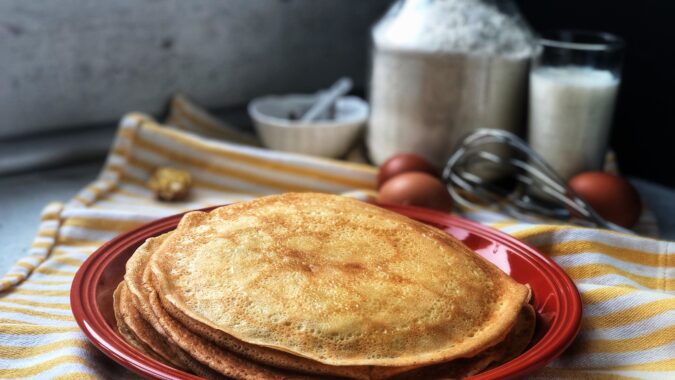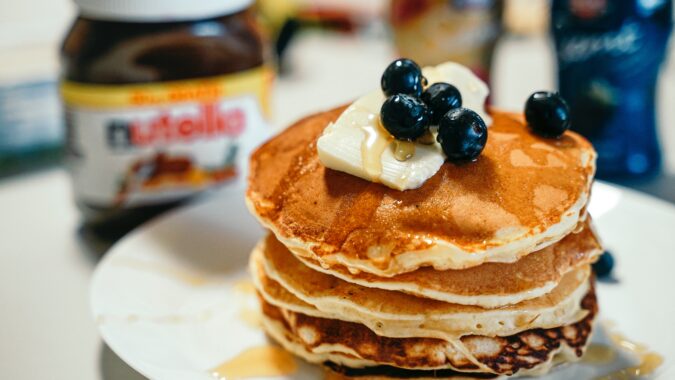Flipping Great Ways to Reduce Pancake Day Food Waste
Shrove Tuesday – commonly known as Pancake Day, Pancake Tuesday, or Fat Tuesday – should be one of the most celebrated days for reducing food waste. It’s observed by Christians around the world as the day before Ash Wednesday and the start of Lent – 40 days when many Christians fast (or give up a luxury food or drink item).
The idea of pancakes comes from the tradition of using up rich and luxurious foods (mainly eggs, milk, and sugar) before the fast starts. While the religious ties may have lessened in the UK, slapping together sweet and savoury pancakes on this Tuesday is as strong as ever. However, the practice of reducing food waste has also fallen off, with the day creating more waste food in some cases.
Don’t let your day go as flat as those first pancakes by adding to the UK’s already terrifying food waste figures. Discover how to reduce food waste in your home or business when flipping those pancakes this Shrove Tuesday.

Pancake Day waste stats
Somewhere around 117 million pancakes are eaten in the UK on Shrove Tuesday every year. However, plenty end up flipped onto the floor or the leftover mixture is thrown away. Get a batter idea about how much waste Pancake Day creates with these food waste facts and figures:
- More than 25 million pancakes are wasted in the UK – as they’re burned, undercooked, or flipped onto the floor.
- 52 million eggs are cracked to create pancakes in the UK on Shrove Tuesday about 22 million more than on any other day.
- A third of Brits believe the first pancake made is the worst.
- An average of five pancakes are made in each household, but almost one of these is a failure and wasted.
- Brits eat an average of two pancakes on Shrove Tuesday.
- One in five people make too much pancake batter.
- 38% of people throw failed pancakes in the bin – although 29% still eat them and 11% feed them to a pet.
- One in three people buy readymade pancake mix, rather than making batter from scratch.
- Around four million extra pancakes could be made from all the eggs and milk thrown out in the UK every year.
Ways to eliminate
pancake waste
Pancakes aim to reduce food waste by using up those ingredients at the back of your store cupboard. Yet many of us end up doing the opposite, whether it’s having too much batter and pancakes left over or throwing away excess ingredients. With a bit of planning and a few simple actions, you can easily reduce your waste this Pancake Day.
Plan your pancakes
Follow a tried and tested pancake recipe so you’ve got a good idea of how many you’ll make. Portion control is important to avoid excess batter and pancakes, so consider how many you’ll all likely eat before you begin. Measuring jugs, scales, and frying pans are your friend here.
Planning your portions also helps estimate how many ingredients you need to save money by avoiding overbuying items. Check your cupboards before you go shopping as you might already have most of the things you need to make pancakes. Flour and sugar especially last for ages and are used in many other recipes. It’s a great way to use up ingredients and reduce food waste.
If you do need to buy fresh ingredients, consider shopping at a zero-waste store. This can reduce the amount of packaging waste created when preparing pancakes.

Use food waste sustainably
After making and devouring a plateful of pancakes you’ll still end up with some food waste. Many ingredients such as flour and sugar last for a long time when stored properly. Put your flour in an airtight container in your pantry, or even in the fridge or freezer to further prolong its lifespan.
Even leftover fresh ingredients like butter last for a while in the fridge or at room temperature. And there are plenty of ways you can use it up, from spreading it on toast and frying to baking all sorts of cakes. There are various sustainable ways to get rid of pancake ingredients, rather than throwing them in the bin:
- Eggshells – you’ll end up with lots of eggshells, but the good news is you can crush them up and compost them. Or scatter crushed eggshells around plants in your garden to deter slugs and snails from eating them.
- Lemon skins – you can compost a few lemon skins but not too many, otherwise, your compost pile could become overly acidic. Other options include grating the zest when baking, creating candied lemon peel, or drying it out to form homemade potpourri.
- Bananas – sliced bananas are a poplar pancake topping but any leftovers can become overripe quickly. Baking banana bread or popping them in a smoothie is a tasty way to use them up. Adding to compost is a last resort.
- Milk – if you’ve got too much milk you can’t use before its expiration date consider freezing it. Should you have passed that point you can still use sour milk in scrambled eggs, milkshakes, and baking without impacting the taste.
Recycle pancake packaging
Pancake Day throws up more than just food waste. There’s all the packaging for your ingredients to deal with as well. Check the labels first but thankfully most packaging should be recyclable, which is a more sustainable option than throwing them away with your general waste. Recycle different packaging materials in the following ways:
- Glass recycling – glass bottles and jars for milk, honey, and jam should be rinsed out and recycled at your local bottle bank. Businesses can arrange glass waste collection.
- Plastic recycling – plastic milk bottles, margarine tubs, and pots should be washed out and dried then put in your household recycling bin. Check the plastic number and if your local authority accepts the type in your domestic recycling if you’re unsure.
- Paper recycling – flour and sugar bags are often made of paper, which can be recycled with your household recycling. Try to remove as much flour or sugar as possible but ensure the packets stay dry.

What to do with
leftover pancakes
No matter how carefully you plan your pancakes, things change, and you might end up with more than you can stomach. Don’t throw them away in your general waste bin or with food waste though, as there’s plenty of life left in any uneaten pancakes:
- Freeze leftover pancakes. Place a baking sheet between each one and layer them up in the freezer. When you feel peckish for a pancake simply take out as many as you fancy and warm them up in the microwave.
- Freeze pancake batter. Put it into a container or bag and pop it in the freezer, then place it in the fridge overnight to defrost when you’re ready to make more.
- Make Yorkshire puddings. If you’ve got any pancake batter left over you can put it in the fridge for the next day to whip up some Yorkshire puddings, as it’s basically the same recipe just a different shape.
- Get baking with leftover toppings. Lemon juice, chocolate spread, honey, and sugar are all the main ingredients for all sorts of sweet treats. Find a tasty cake, cookie, or dessert recipe you can use them up in, or just add into some natural yoghurt for a simple option.
How long are leftover
pancakes good for?
Leftover pancakes are good for up to one week when kept in the fridge. When you have a larger amount left over you can freeze them for up to three months. Wrap them up tightly in a plastic bag with baking sheets separating each one or in an airtight container.
Have your waste collected
Get a fast FREE quote for your waste collection 0800 211 83 90
- Free quote within 1 hr
- Any type of waste
- FREE bins and delivery
- We cover all of the UK